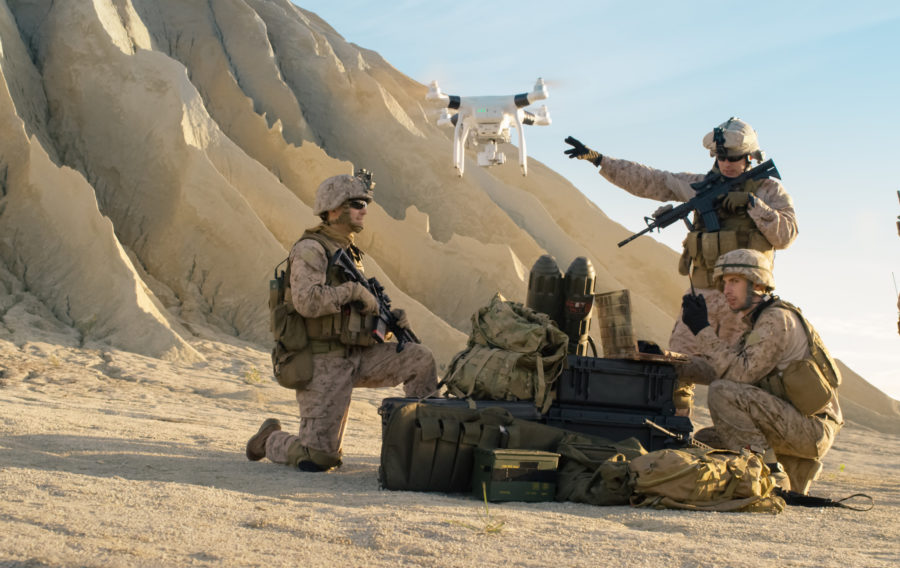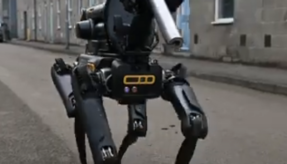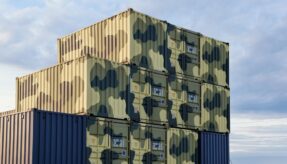
Dubbed ‘the last mile’, the final stage of transporting supplies to troops on the front line in hostile and challenging environments can be a dangerous undertaking.
Gone are the days of the British Mule Pamphlet, issued in 1928, advising that a mule should carry more than 25% of its bodyweight. Now, 90 years on, in order to reduce resupply uncertainty, the modern-day infantry soldier carries around 82% of his bodyweight in combat equipment.
This increase in the physical burden placed upon troops can, unsurprisingly, lead to fatigue and injury, in turn limiting combat effectiveness as troops traverse the modern battlespace facing adverse weather conditions, complex urban environments, and more conventional threats such as explosions and enemy fire.
The British Army relies on a range of ground-based and aerial delivery platforms such as transport aircraft, helicopters, trucks, soldiers on foot and quad bikes to resupply the front line but the advancement of technology in the spheres of robotics and autonomous systems could help improve efficiency and reduce the risk to lives in extreme hostile environments.
Unmanned systems are already used by the British Armed Forces, primarily for the purposes of surveillance and reconnaissance or as part of explosive ordnance disposal capabilities, but the possibility of further exploitation is clear.
In July 2016, the Ministry of Defence announced that the Defence Science and Technology Laboratory (Dstl) would be leading the work with the US Department of Defense to accelerate and demonstrate the effective use of such technologies, with UK troops testing prototypes by 2019.
As part of these efforts, the Defence and Security Accelerator (DASA) held a networking event in May 2017 to promote the Autonomous Last Mile Resupply Challenge.
The frontline commands’ needs are clear: to reduce the demand on existing platforms and infrastructure; reduce the risk to military personnel; increase the efficiency of last-mile logistic resupply operations with pace and accuracy; and provide an assured resupply capability to enable more agile operations in complex environments.
The challenge was therefore set for industry and academia to come up with innovative autonomous systems to deliver mission-critical supplies.
The Last Mile Challenge set out three key targets to develop and demonstrate:
Challenge 1: unmanned air and ground load carrying platforms
Challenge 2: technologies and systems to allow load-carrying platforms to operate autonomously
Challenge 3: technologies to autonomously predict, plan, track and optimise resupply demands from military users
The Last Mile Challenge drew entries from over 140 organisations ranging from SMEs to large defence companies, with the winners announced in September 2017.
In all, 25 projects were chosen from organisations across the UK and worldwide, with a total contract value for the six-month first phase of almost £2 million.
Among the winning ideas were autonomous hover-bikes, unmanned air and ground vehicles, novel means of autonomously loading/unloading, navigating and delivery ordering, and management and control using ‘Uber-like’ and other app-based technologies.
Dstl’s lead for the challenge, Peter Stockel, was full of praise for the quality of submissions, with the majority of them coming from UK-based companies. He said: “The number and quality of the entries for this competition was outstanding and the competition was fierce. We chose the best from across the proposals to enable the system solutions we want for prototype demonstration and evaluation.
“This was a fully open competition, with many of those down-selected happening to come from the UK. This illustrates the strength of our national capability and the benefit of recent investments in this important, and rapidly developing, technology sector.”
Phase one of Dstl’s Autonomous Last Mile Resupply programme has now concluded. Among the entrants selected to participate in the programme was the TITAN autonomous ground vehicle, produced by QinetiQ in collaboration with Milrem, which showcased its capability at QinetiQ’s Hurn proving ground in February 2018.
The exercise saw TITAN remotely tasked from a ground control station to autonomously navigate a route over mixed terrain, demonstrating its ability to deliver supplies to troops stationed in dangerous environments where access is limited.
In a separate exercise conducted as part of the Autonomous Last Mile Resupply programme, QinetiQ partnered with Malloy Aeronautics to stage a demonstration of its Hoverbike unmanned aerial vehicle for delivery of frontline supplies by air.
Malloy’s Hoverbike was required via a wireless link to deliver a 13kg payload by automatically navigating waypoints, avoiding predetermined no-fly zones and adapting its route mid-flight.
Dstl will announce the winning proposals for phase two of the Autonomous Last Mile Resupply programme in May 2018.
Phase two will now see the focus shift to system development and integration in order to improve autonomous system performance and suitability for military environments to produce a prototype system capability.
The prototypes will then be evaluated with the British Army in October 2018 as part of the Army’s Warfighter Experiment ‘Autonomous Warrior (Land)’ (AWE18), in addition to a potential demonstration in the US.
If you would like to join our community and read more articles like this then please click here.
DASA Defence and Security Accelerato Defence Science and Technology Laboratory Dstl US Department of Defense







